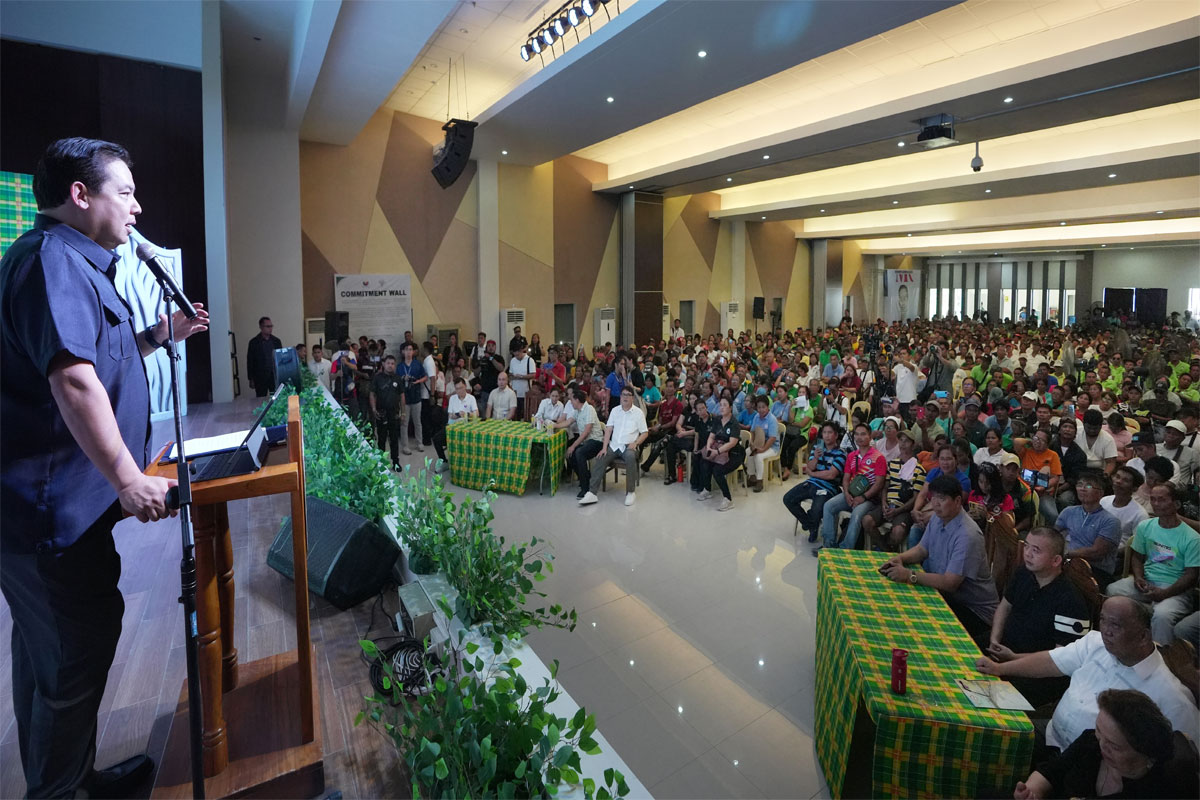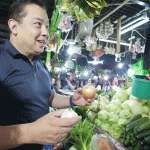 Speaker Ferdinand Martin G. Romualdez delivers his message to more than 1,000 farmers and fisherfolks during the Town Hall Meeting at South East Asian Fisheries Development Center (SEAFDEC) convention center in Tigbauan, Iloilo City. Photo by Ver Noveno
Speaker Ferdinand Martin G. Romualdez delivers his message to more than 1,000 farmers and fisherfolks during the Town Hall Meeting at South East Asian Fisheries Development Center (SEAFDEC) convention center in Tigbauan, Iloilo City. Photo by Ver Noveno
House to immediately probe widening gap between farm gate retail prices of basic goods
SPEAKER Speaker Ferdinand Martin G. Romualdez said he would spearhead an investigation in aid of legislation into the widening gap between farmgate and retail prices of rice and other basic goods as soon as the House of Representatives resumes its session on Monday.
This developed after the meeting of Speaker Romualdez and Deputy Majority Leader Erwin Tulfo with representatives of producers, retailers, and grocery stores on Tuesday where they denied making any substantial price changes.
“I would ask Chairman Mark Enverga of the Committee on Agriculture to immediately start the ball rolling for an investigation into the disconnect between farmgate and retail prices of basic goods,” said Speaker Romualdez, leader of the 300-plus strong House of Representatives.
“The discrepancy between farmgate and retail prices of basic goods is alarming and warrants immediate attention. We cannot ignore the plight of our farmers who are struggling to make ends meet, nor can we turn a blind eye to the burden placed on consumers,” he added.
During their meeting Tuesday, Jayson Cainglet of Samahang Industriya ng Agrikultura (SINAG) informed the Speaker that farmgate prices of rice, poultry, pork, and even onions have been maintained for the past three months so there should be no spike in the prices of these items.
Speaker Romualdez assured the producers and retailers that the House would look into the price discrepancy in the exercise of its oversight function as he also committed to conduct a thorough review of existing laws to protect the interest of both consumers and producers and deter profiteering.
“It is imperative that we conduct a comprehensive review of our laws to ensure that they effectively safeguard the interests of our farmers and consumers. We must take proactive measures to prevent profiteering and promote a fair and transparent trading environment,” Speaker Romualdez said.
The Speaker urged all stakeholders, including government agencies, industry representatives, and consumer advocacy groups, to actively participate in the investigation and contribute to the formulation of effective policy interventions.
Among others, Speaker Romualdez said the review aims to identify and address loopholes that may contribute to profiteering and unfair pricing practices within the supply chain.
“At the end of the day, we want to make sure that all the stakeholders in whatever industry or sectors are viable, if they are in the business side of it, so that it becomes sustainable so that we can continue delivering basic goods and services to the consumers at sustainable, affordable prices,” Speaker Romualdez explained.
Meanwhile, as the process of instituting reforms to ensure a stable supply and affordable prices of food is being undertaken, Romualdez said the House remains committed to supporting safety nets—and even expanding them— to cushion vulnerable sectors of society from the effect of rising food prices.
“We would have to work toward widening the scope of these interventions while we are simultaneously working on the long-term solution or target of rice self-sufficiency, and efficiencies are generated, and less dependence on expensive, imported rice,” Speaker Romualdez said.
Speaker Romualdez cited, among others, the Cash and Rice Assistance (CARD) program—a joint initiative of the House and the Department of Social Welfare and Development—that provides qualified indigents with rice, along with cash for other food items.
Likewise, he noted the DSWD’s Assistance to Individuals in Crisis (AICS) Program, which provides medical assistance, burial, transportation, education, food, or financial assistance for other support services or needs of a poor person or family in crisis; as well as the Ayuda para sa Kapos ang Kita Program (AKAP), designed for those classified in the “near poor” segment to prevent them from spiraling down below the poverty line.


















